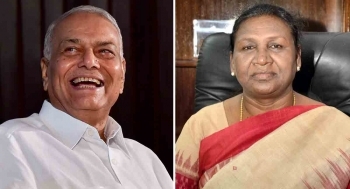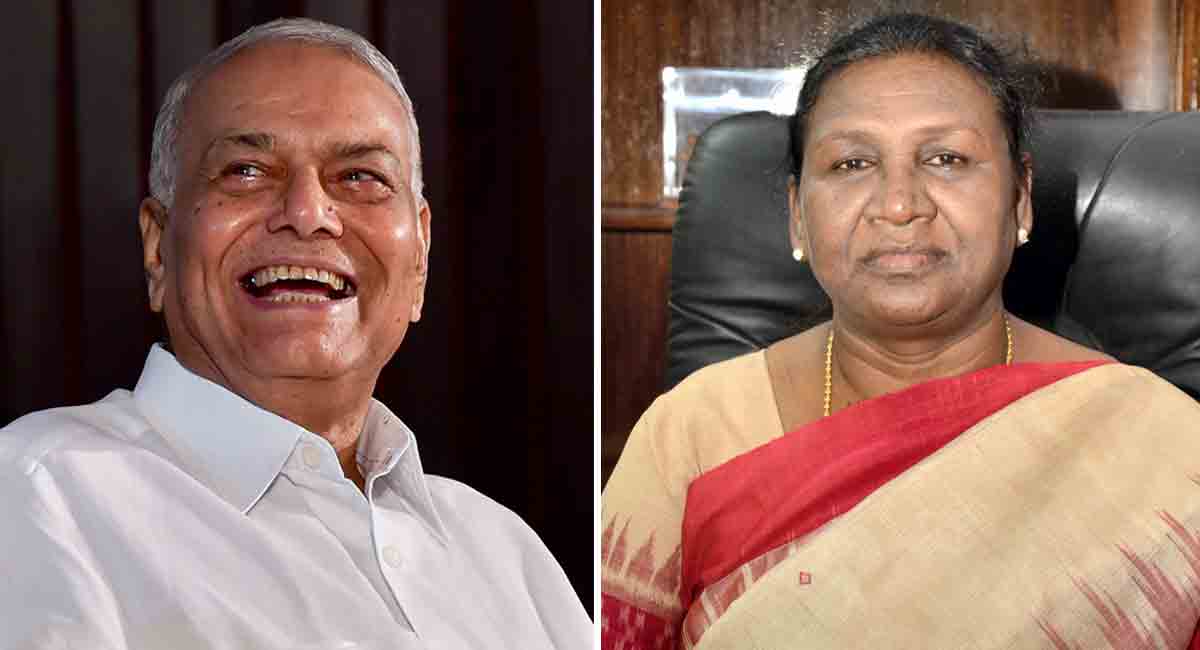
.png) Jaswant Kaur
Jaswant Kaur

In less than a month from the publication of this column, India will have a new President. The election commission has declared the presidential election on July 18, 2022. President Ram Nath Kovind’s term will end on July 24. The process of nomination has already started. A few candidates filed their applications on day one itself. However, all eyes were on the candidates nominated by the ruling party and the opposition.
Well, the suspense is over. The BJP and its allies have nominated former governor of Jharkhand, Draupadi Murmu, while the Opposition has fielded Yashwant Sinha, a former finance minister. Within a few minutes, the micro-blogging site Twitter was flooded with tweets praising the ruling party for choosing a candidate from a tribal area and that, too, a woman. A video showing her sweeping the floor of a temple has gone viral
“Wise decision by NDA govt in selecting a down to earth candidate Mrs. Draupadi Murmu for Presidential polls…,” says one tweet. Yet another says, “The video speaks for itself. BJP has considered a woman from a backward class, who leads a simple life, as its next presidential candidate. Real empowerment of women. It is this ideology that sets the BJP apart from other parties.”
Another tweet shows pics of the late Abdul Kalam Azad, Ram Nath Kovind and Draupadi Murmu, with a tag Muslim, Hindu Dalit and Adivasi woman respectively. The tweet says ”BJP is against Muslims. BJP is against Dalits. BJP is against Advasis”. Such tweets are being circulated to create a positive image about the BJP.
Yet another set of tweets present Yashwant Sinha in a poor light. He is being labelled as a “failed” finance minister. It appears that the presidential election has become a Murmu Vs Sinha contest. People are forgetting that presidential elections are very different from the Lok Sabha elections. Popularising one candidate against the other will not produce results.
It hardly matters what kind of opinion people hold about a particular candidate. Ultimately, the one who is able to manoeuvre the complex number game in these elections will be the winner. Before we delve further, it is important to understand what is expected out of the President. Should it matter that the proposed candidate is a tribal or an Adivasi or a Muslim or a Dalit?
Lest anyone should label this writer as insensitive, it is important to mention that she wants a person representing any/all of these communities to be the President. However, that should not be the only qualifying/eligibility condition for taking on the role of the President.
Of late, we have been witnessing a highly-charged environment. Some of our youth have gone berserk. The Agnipath scheme has added fuel to fire as if unemployment was not enough. Their aspiration to serve the nation by joining the armed forces is being mocked at. People are adopting violent means to express their anger.
Not only this, religion is being used as a tool to create a rift amongst communities. Be it Punjab, Uttar Pradesh, Haryana or Rajasthan, rarely any place is free from communal tension. Internationally, India has witnessed the wrath of several Muslim-dominant countries, which expressed their anger on the way Prophet Mohammad was projected by a prominent speaker of the ruling party. It is a different matter that the ruling party disowned her.
It is not a surprise that the latest report published by the National Crime Records Bureau (NCRB), shows an increase of 95 percent in the cases of communal or religious rioting. This happened despite the pandemic-induced lockdown, reduced income levels and several other issues that we the general public faced.
If we look at a few months down the memory lane, one can recall the huge protests organised by the farmers. In fact, all kinds of tactics were used by the powers that be to scuttle the movement. The farmers were adamant about their demands. Nothing deterred them from demanding their rights. The government had to finally accept their demand. The Prime minister had to personally appeal to the farmers to withdraw the protest.
The case was no different when the citizenship amendment act (CAA) was suddenly passed. People, especially from the minority community, were worried whether they will still be called Indian citizens! The law had triggered massive protests. The national capital witnessed one of the worst riots during that time. Thousands of people had lost their houses overnight. Several were found dead and injured. But for the pandemic, the protests would have continued. The CAA agitation would have taken many more lives.
But has anyone thought about what has triggered such violent events? Do they show an outburst of pent-up feelings of people from one community against the other? What has been the government’s role in such incidents? What should have been done to avert such incidents?
They say, power corrupts and absolute power corrupts absolutely. The incidents discussed above show nothing but the sheer apathy of the government towards the masses. Be it the Agniveer scheme or the farm laws, or the CAA, the government has missed one important aspect – the consultative process for understanding the stakeholder needs and taking them into confidence before making any announcement or promulgating statutes.
So was the case with demonetisation and GST. They were presented as masterstrokes which could produce results overnight, without giving thought to their ill effects. Their sudden implementation affected the poorest of the poor very badly. The rich were able to easily absorb the shock.
Now many would say, how are these events related to the Presidential elections? Why should they be even discussed? Well, a strong President would have raised an objection before converting these Bills into Acts. Technically, the President has a lot of power. Whosoever occupies the position can scuttle the ulterior motives of those who enjoy unbridled power.
However, we have rarely seen any of the presidents using his/her power but for a few sporadic incidents. If we look at our history, the first President, Rajendra Prasad, had set a precedent for his successors. A veteran activist, who had gone to jail several times during the freedom struggle, he had expressed his concern to Nehru during the passage of the Hindu Code Bill. Gaini Zail Singh, a diehard Congress follower, too had kept the Rajiv Gandhi government on tenterhooks. They did not adopt the easy way of using their pen merely for affixing their signatures.
India, that is Bharat, needs a candidate, who looks at the best interest of the nation as the defining criteria for taking decisions rather than the interest of a few. We certainly do not want someone who will simply toe the line of the government. We want stability, safety, peace, love and harmony. Only then, can this country prosper.
It is time to reiterate the age-old saying, “United we stand, Divided we fall”. We want a President who can inspire confidence and use his/her pen for the common good. We want a voice who can become the voice of the people and strengthen the democratic fabric of the country. People must know that the President’s chair is above all. It is not just ornamental or ceremonial.
The writer, a company secretary, can be reached at jassi.rai@gmail.com